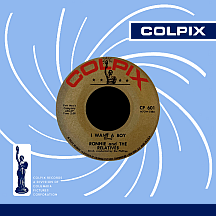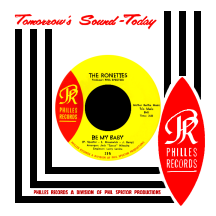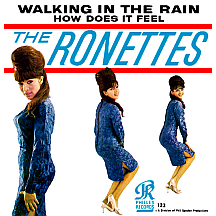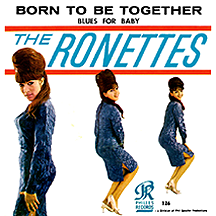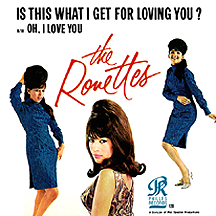THE RONETTES
The success of The Ronettes hinged on timing. It was a case of right-place, right-time one night at New York's Peppermint Lounge where Joey Dee and the Starliters were twistin' the night away and the girls joined the highly-publicized party. Later, they were courted by Phil Spector, a little more than a year after he and Lester Sill had started Philles Records, quickly scoring hit singles by The Crystals and Bob B. Soxx and the Blue Jeans. He had chosen the attractive trio to be his "next big thing," but it wasn't just about spotting talent: Phil was smitten with the group's lead singer, Veronica Bennett.
They always considered themselves a family act. Veronica, two-years-older sister Estelle Bennett and younger cousin Nedra Talley grew up together on Manhattan's West Side and performed at local dances for a brief time in the late '50s as The Darling Sisters. Their Peppermint Lounge debut happened quite by accident in early 1961 when the dressed-to-the-nines trio was mistaken for hired dancers and went along with the flow, dancing with Dee and the Starliters and getting an ongoing gig as a result. That summer they were signed by Colpix Records as Ronnie and the Relatives; Estelle sang lead on the group's early singles, "I Want a Boy" and "I'm Gonna Quit While I'm Ahead" (the latter on Colpix subsidiary label May). Changing the group's name to the Ronettes (a mashup of their names), 1962 singles with lead vocals by Veronica included "Silhouettes" (a remake of The Rays' '57 original) and "Good Girls." These were appealing productions, yet none generated much interest. During this time they also worked as backing singers on other artists' studio sessions.
At some point, Spector spotted them at the Lounge and couldn't get the image out of his head. Philles had been in business for several months when he finally quit an overlapping position with Liberty Records after lifting Gene Pitney's "He's a Rebel" for his own use, cutting Snuff Garrett's version by Vikki Carr off at the pass and taking the Darlene Love-led Crystals to the top of the charts with his superior version. As of late 1962, the Ronettes were under contract to Don Kirshner and Phil had little trouble securing the non-hit act for his own, though the details on how he pulled it off are sketchy. Despite the streetwise appearance they'd flaunted at the Peppermint Lounge, in addition to their experience with label executives and record producers, the three were still somewhat naive; the extent of their "partying" at the Lounge was limited to time spent onstage and alcohol consumption was a strict no-no. All three still lived on the West Side with their parents (or parent, as they case may be); Estelle and Veronica's mother was an ever-present chaperone.
The "Ronnie" image was largely unintentional; a natural beauty, she had developed her suggestive dance moves on the Peppermint stage and could hardly control the way men reacted to her in public. Spector was one such man; eventually he and his latest muse were meeting privately, though he couldn't conceal it from his wife, Annette (Merar) Spector, who instantly noticed he wasn't behaving normally (or whatever she knew to be "normal" by Spector standards). By the time the session began for the Philles debut of the Ronettes, Phil was going at fever pitch, driving his studio musicians to the brink of madness in his quest for perfection. Ronnie's vocals were front and center...her 'whoa-ho-ho-ho-ho...' come-on (heard as far back as the first Colpix single) lured listeners into "Be My Baby" (penned by Jeff Barry and Ellie Greenwich), a two-minute-and-20-second opus that went to number two on Billboard and number one for a week on Cash Box in October '63. Unsurprisingly, he began prioritizing his new hitmakers over the Crystals, Bob B. Soxx and Darlene.
Demand for live appearances came quickly; on September 4, as the song was just starting its rise, they appeared on Murray the K's Holiday Show at the Fox Theater in Brooklyn and at the Cow Palace San Francisco later in the month, sharing the bill with major stars (The Beach Boys, Miracles, Drifters, Jan and Dean and Little Stevie Wonder, to name a few). Joey Dee released "Getting Nearer," a song featuring uncredited vocals by the group, but it went nowhere. Then the entire stable of Philles acts took part in an intense studio marathon for seasonal LP A Christmas Gift For You From Phil Spector, featuring three by the Ronettes: "Frosty the Snowman," "Sleigh Ride" and "Winter Wonderland."
Dick Clark scheduled the Ronettes on his Fall 1962 Caravan of Stars tour (15 acts total with Bobby Vee the headliner and a few of the Ronettes' female peers: The Jaynetts, The Dixiebelles and Little Eva). It was to be a grueling 27-city trek over 30 days (though two shows, on November 22 and 23 in Dallas and Oklahoma City, were canceled due to John F. Kennedy's assassination). But Spector, deep into his infatuation with Ronnie and jealous of other possible suitors, wouldn't allow her to go. The group joined the tour with Elaine Mayes (another cousin, keeping it in the family!), while Nedra moved to the lead vocalist spot; later, Phil decided promoting Ronnie as the star of the act was more important than any distrust and he let her perform on the later dates. The 22nd was also the day the Christmas album was released to mostly positive reviews; Phil was enraged when it generated very little airplay or sales.
In January, Spector and the Ronettes traveled to England, just as The Beatles and other British acts were beginning to seriously alter America's tastes in music. They spent three weeks opening for the as-yet-unproven Rolling Stones on the band's second tour of England. Back in the U.S., songwriters Barry and Greenwich (who shared writer credit with Phil, though his input was often minimal) continued to construct romantic mini-plays per Spector's vision. These weren't harder-hitting social narratives like the Crystals had done ("Uptown," "He's a Rebel") or modernized exercises in nostalgia (such as "Zip-A-Dee Doo-Dah" by Bob B. Soxx and the Blue Jeans). They were love stories of the longing, yearning, hopeful variety...fine-tuned for young female consumers. "Baby, I Love You" reached a mildly disappointing top 30 peak in January 1964.
When "Chapel of Love" (a Barry-Greenwich song recorded by the Ronettes but left on the shelf) appeared by The Dixie Cups on Jerry Leiber and Mike Stoller's Red Bird Records, it went all the way to number one. Phil took this as a personal affront and refused to continue his association with Jeff and Ellie. Providence, Rhode Island-raised pals Vinnie Poncia and Peter Andreoli were recommended and the three collaborated on the next Ronettes single, "(The Best Part Of) Breakin' Up," which hit the top 40 in May. Estelle and Nedra took issue with Phil's side projects for his Phil Spector label, solo outings credited simply to Veronica ("So Young" and a leftover Barry-Greenwich tune, "Why Don't They Let Us Fall in Love"). Neither record clicked, but the Ronettes had a summer '64 hit, "Do I Love You?," their fourth to reach the top 40....not bad considering each production adhered closely to the "Be My Baby" formula.
"Walking in the Rain" was different, and not simply for the "downpour" sound effects. This one had something special, a Barry Mann-Cynthia Weil song (with one-third credit to Spector, a condition Barry and Cynthia verbally disagreed with) that seemed to be the trio's best shot a getting another top ten hit, though it fell short of just about everyone's expectations, landing in the all-too-familiar top 30 zone in late in the year, just as their long-awaited album finally arrived. Nedra in particular was not pleased with Phil's constant massaging of Ronnie's public image while she and Estelle languished in the shadows; she bristled at the album's title, ...presenting the Fabulous Ronettes featuring Veronica. The group's version of "Chapel of Love" was tacked onto the end of side two, a little too late to convince anyone it had predated the Dixie Cups' smash hit. The situation was growing dim; other girl groups (particularly Motown's Supremes and Martha and the Vandellas) were providing stiff competition that would soon bury them. While 1965 Ronettes releases (Spector, Mann and Weil's "Born To Be Together" and Spector, Gerry Goffin and Carole King's "Is This What I Get For Loving You?") fell short, The Righteous Brothers were riding high under Phil's watch with "You've Lost That Lovin' Feelin'" and "Just Once in My Life" by the same composers. Estelle and Nedra were no longer important to Phil. But Ronnie had rocked his world.
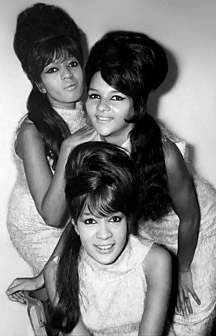
Spector signed on as musical director for The Big T.N.T. Show (a sequel to the popular T.A.M.I. Show of the previous year), a concert videotaped over two nights in November at Hollywood's 1000-seat Moulin Rouge nightclub (its name was changed to the Hullabaloo a few weeks later). Transferred to film like its predecessor, this sequel had a slightly-less-stellar cast (The Byrds and Petula Clark, who hadn't yet broken big when the first installment was staged, were among its stars) that included the Ronettes and climaxed with a wild performance by Ike and Tina Turner, who would become Phil's next priority. The movie made it to theaters in January 1966 and within a few months, Phil and Annette had untied the knot; after the divorce, he and Ronnie openly flaunted their relationship. He became unusually controlling; the Ronettes were scheduled for The Beatles' summer '66 U.S. tour (their last live hurrah, as it turned out), but Ronnie chose not participate (cousin Elaine once again stepped in). Giving in to an ultimatum from Phil ("Go on the tour...or marry me!'), she chose the latter, though the wedding didn't take place until 1968. The marriage grew more strained as time passed; sometimes he showered her with lavish gifts, other times he was abusive but managed to stop short of physical violence.
By the time "I Can Hear Music" was recorded, Phil's enthusiasm for the Ronettes had long since diminished; he even let Jeff Barry finish the production. Not much of a push was put on the act's final Philles single; it slipped in at number 100 on the chart for one week in October 1966. The Righteous Brothers had left him for Verve Records and his self-proclaimed "masterpiece" by Ike and Tina, having fallen by the wayside after he'd assured the T.N.T. closers it would be a chart-topper, he became severely disillusioned. Philles Records was shut down in mid-1967. "I Can Hear Music" had more potential than he'd given it credit for; in 1969 a version by the Beach Boys became a top 40 hit (Brian Wilson, who'd always idolized Spector and aspired to produce at his level, sometimes reached heights Phil had been unable to).
Nedra, unwilling to deal with Phil any longer, left the group (in the 1970s she began a long career performing Christian music). Estelle also quit, then showed up on a mid-1968 single, "The Year 2000," produced by Teddy Vann for Laurie Records. After taking a break (during which time he and Ronnie settled into family routine, adopting three children), Spector got the itch to make more studio magic. Aware of the challenge that faced him, he signed a deal with Herb Alpert of A&M Records. Another independent L.A. mogul like himself and a fellow Fairfax High School alumni a few years older than Phil, the two shared a mutual respect (another way of putting it: Alpert never got on Spector's bad side). In early 1969, he booked studio time at A&M for the Ronettes' big return. Two well-known songwriters, New Yorker Toni Wine (who lent her voice to comic book/cartoon band The Archies, one of the year's top acts!) and New Jersey-born Irwin Levine wrote "You Came, You Saw, You Conquered!" (with Phil's input and a one-third writing credit per his usual routine). A solo performance by Ronnie reminiscent of the group's heyday (credited, not unlike the earlier LP, to The Ronettes featuring the voice of Veronica) failed to connect in the harder-rocking environment of the late '60s.
George Harrison, an unabashed Ronettes fan, composed and produced a single for Ronnie in 1971. "Try Some, Buy Some," a love song with audio similarities to Harrison's work on All Things Must Pass and Ronnie's signature 'oh-ho-ho-ho,' made a minor chart appearance on the Apple label in May 1971. Estelle had quit the music business for good, due partly to health issues, and was not available for a reunion. Ronnie started a new group with Denise Edwards and actress-singer Chip Fields; "Lover Lover" (from 1973) and "I Wish I Never Saw the Sunshine" (an earlier Barry-Greenwich-Spector song remade and issued in early '74), on Buddah Records under the name Ronnie Spector and the Ronettes, were unexceptional efforts. Phil and Ronnie finally got divorced in 1974. No longer subject to his whims, she focused on her solo career as Ronnie Spector; Phil worked with her one last time, producing "Paradise," which he'd written with Harry Nilsson, in 1976. The following year, Billy Joel's "Say Goodbye to Hollywood" was produced by Bruce Springsteen's right-hand man Steve Van Zandt (calling himself "Sugar Miami Steve"); a rousing number by Ronnie Spector and the E Street Band, it surprisingly had limited reach.
In early 1978, her cover of Bonnie Tyler's "It's a Heartache" (penned by Tyler's managers, Ronnie Scott and Steve Wolfe) competed unsuccessfully with the original. Fate smiled on her in 1986 when she joined Eddie Money for "Take Me Home Tonight (Be My Baby)," a top ten hit based in part on her signature Ronettes smash. A contract with Columbia Records yielded two singles and an album, Unfinished Business. Meanwhile, Spector's slow-starting '63 Christmas album never ceased building momentum, keeping the Philles roster of artists in the spotlight for several weeks each year. The Ronettes' "Wall of Sound" rendition of Leroy Anderson's "Sleigh Ride" emerged as one of the holiday season's all-time most popular recordings. Might it become...just maybe...a well-deserved second top ten hit for The Ronettes? Note to anyone living in the 1960s who's reading this and lacks access to a time machine: you're going to have to wait a very long time to find out the answer!
NOTABLE SINGLES:
- I Want a Boy - 1961
as Ronnie and the Relatives - I'm Gonna Quit While I'm Ahead - 1962
as Ronnie and the Relatives - Silhouettes - 1962
- Good Girls - 1963
- Be My Baby - 1963
- Baby, I Love You - 1964
- (The Best Part Of) Breakin' Up - 1964
- So Young - 1964
by Veronica - Do I Love You? - 1964
- Why Don't They Let Us Fall in Love - 1964
by Veronica - Walking in the Rain - 1964
- Born to Be Together - 1965
- Is This What I Get For Loving You? - 1965
- I Can Hear Music - 1966
- The Year 2000 - 1968
by Estelle - You Came, You Saw, You Conquered! - 1969
as the Ronettes featuring the voice of Veronica - Try Some, Buy Some - 1971
by Ronnie Spector - Lover Lover - 1973
as Ronnie Spector and the Ronettes - I Wish I Never Saw the Sunshine - 1974
as Ronnie Spector and the Ronettes - You'd Be Good For Me - 1975
by Ronnie Spector - Say Goodbye to Hollywood - 1977
by Ronnie Spector and the E Street Band - It's a Heartache - 1978
by Ronnie Spector - Take Me Home Tonight (Be My Baby) - 1986
by Eddie Money with guest vocals by Ronnie Spector - Who Can Sleep - 1987
by Ronnie Spector - Love on a Rooftop - 1987
by Ronnie Spector


